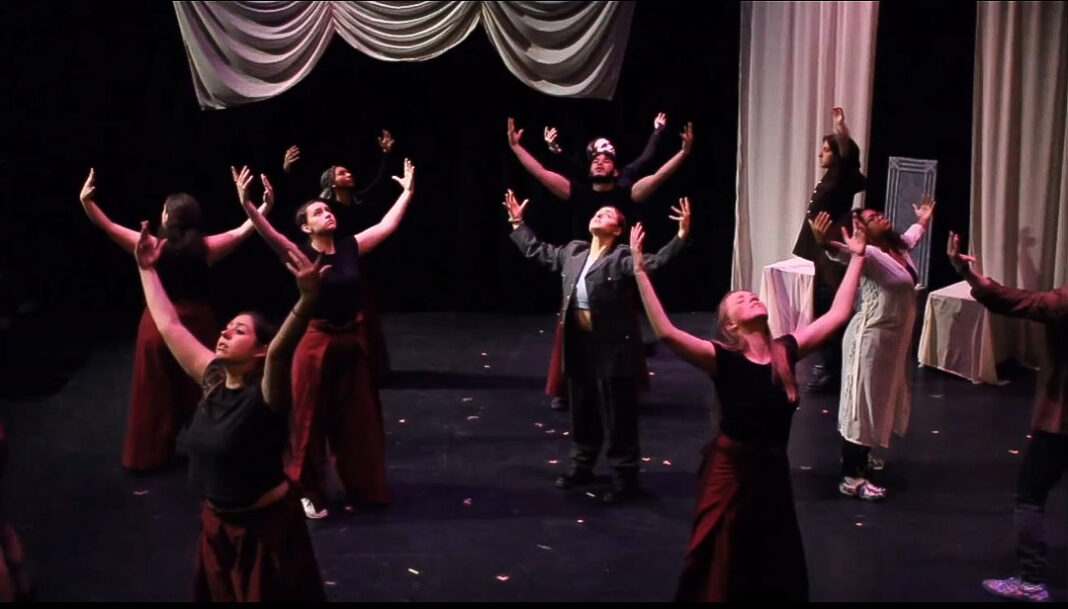From Apr. 4. to Apr. 7., the Muhlenberg Theatre Association (MTA) catapulted audience members back to ancient Thebes, through the door to love and on the way to Oregon. A semesterly festival organized entirely by the student-run organization, the Spring 2024 Studio Shows featured three works, two of which were Sophocles’s “Antigone,” and John Cariani’s “LOVE/SICK.”
“Antigone” tells the story of the titular character as she rebels against orders to leave her brother’s body unburied. A tragedy at heart, the play highlights the dehumanizing nature of war. As a “social activist first and an artist second,” Director Bryson Brunson ‘25 shares hopes that the play communicates the truly destructive sense of war across time, even now with contemporary conflicts like that in Palestine. Touching on this, Hanajah White-Wise ‘26, who played Ismene, Antigone’s sister, shares, “I think making this kind of art is what we need to see especially when it comes to marginalized groups and people, so as Bryson said, it is an ode to what is going on in the world.”
One decision Brunson made that was particularly powerful was to include dance. Brunson shares, “Dance was something really important to me in the use of storytelling because of the way movement captures what we cannot say with words.” White-Wise also shared, “I was very interested in the dance elements, and I was so grateful to have worked with Desiree [Oliver ‘25] as our choreographer.”
But the process wasn’t always harmonious, according to Brunson. “While we may have created a wonderful show, I would be remiss if I did not mention that at times there was a lack of care for me and my all-Black creative team while working on this production,” Brunson says. “Unless there are structural changes to the organization, I cannot in good faith recommend other students of color to work with [the MTA]. Black art is something they are unaccustomed to and it created a lot of issues on the production side of things because although they want to work with more students of color they often failed to accommodate for the needs of students of color that our white counterparts don’t request.”
“But I want to reiterate that this is not a condemnation of the MTA,” Brunson clarified. “It is a call to action for them to work harder and listen to students of color to foster a space that is not just diverse but EQUITABLE and INCLUSIVE.”
Despite the challenges of the process, Brunson expresses great gratitude towards this piece. Brunson said, “[‘Antigone’] being my first directorial credit makes me feel really proud of what I and other students of color can do on this campus in arts when we are given creative liberty.” White-Wise seconded this, stating, “I can say for my first show here it was amazing!”
However, “Antigone” was not the only tale to grace the stage. True to its title, “LOVE/SICK” followed a varied cast of characters as they navigated the ups and downs of love’s tumultuous journey. Audience member Ella Zalot ‘27 remarked, “I loved the way that the stories felt so unique and personal as I was watching them. The way the whole story came together at the end was unexpected but satisfying.”
Nola Thompson ‘27 added, “This play has an undeniably unique authenticity while also allowing the audience to relate to the conversations and experiences that the characters have in the individual vignettes.”
Giving insight into the directing process of the show, Director Becca Millevoi ‘24 shares, “I gave my actors a lot of autonomy in this process. I provided structure, tone and blocking but I really wanted them to be able to bring themselves into the acting. I find the best acting I see comes from people who incorporate their own circumstances into the work and so, I wanted to implement that foundation into this piece as much as possible.” She emphasizes, “I could not be more thankful to my cast and creative team for making this production something really special.”
The third show is “The Trail to Oregon,” which is a StarKid musical based on an old video game “The Oregon Trail” and in Muhlenberg’s rendition, it was directed by Nicholas Pierron ‘24. The show follows a family of five as they try hilariously to make it to Oregon in 1848. A notable and fan-favorite aspect of the show is when it becomes interactive with the audience. Julian Torres ‘25 said, “I think the improvisational aspect of it is really funny. That’s what I really enjoyed.”
Due to the interactive portions of the show, the names of the family members were determined by the audience, adding to the comedic entertainment. Cast members would look to the audience for suggestions and come close to the first row as the audience would erupt in yelling, shouting for their option to be picked. Both daughters were named by the audience in the second show “Team Edward” and “Team Jacob” while the father was named after a character in “The Lorax,” “Once-ler.” All three shows had different names, based on whatever was chosen from the audience.
Towards the end of the show during its second night, the last song had the music cut out, but the cast members fended off this worry by singing the rest of the song and a capella-ing the rest. This added to the comedic element of the show and ended the show’s run on a high note because although it didn’t end as planned, it elicited laughter from the audience that was the loudest of the night— which says a lot because the whole night was filled with it.























